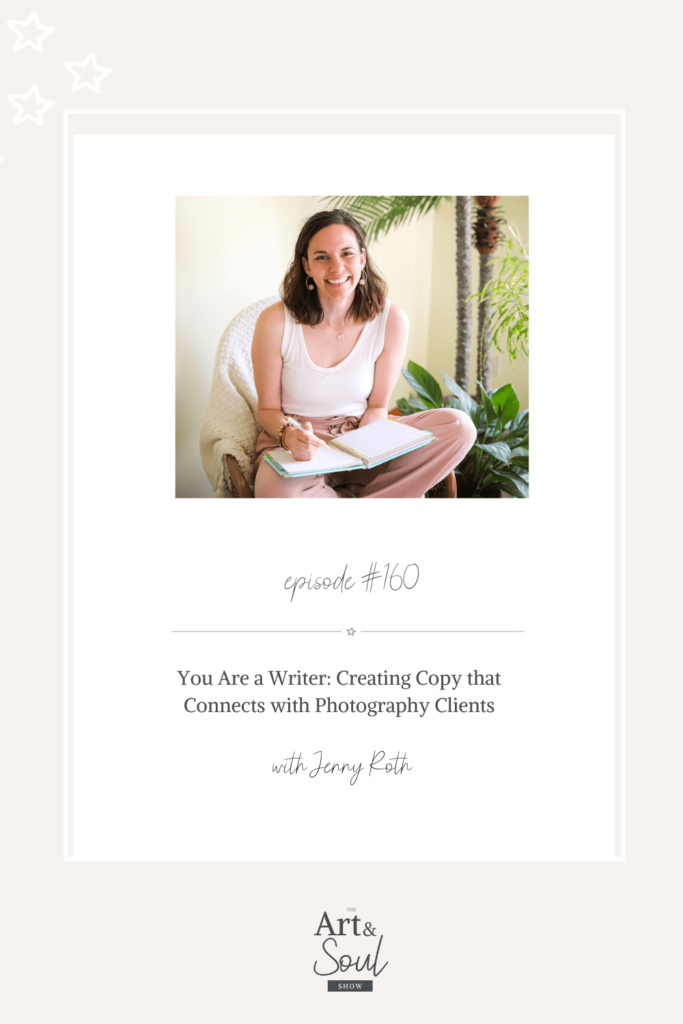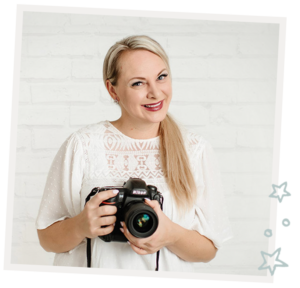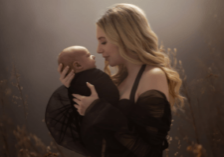You Are a Writer: Creating Copy that Connects with Photography Clients with Jenny Roth
Photographers, and many other creative entrepreneurs, don’t often think of themselves as writers. It’s easy to get stuck in your head and think that if you’re a “bad” writer, you’ll never be able to write successful copy that draws in the clients you want to work with. The truth is that being a “good” writer just means being you.

In today’s episode, I’m talking with Jenny Roth, an email and website copywriter for coaches and creative service providers. She’s sharing how to embrace your uniqueness in your content creation, use client feedback to narrow in on your message, create a consistent tone that will catch someone’s eye, and what to avoid when it comes to crafting your message.
Jenny has built a business crafting messages for her clients that get their clients excited about reading their websites and email newsletters and, ultimately, working with them. She shares some wonderful tips and tricks for focusing on what makes you unique and putting that into your messaging. Anyone can write with a little practice, and I hope that this episode inspires you to get out of your head and start writing.
What’s in this episode:
- [02:58] Jenny’s tips for writing a really great bio and elevator pitch and embracing your uniqueness in the process
- [06:58] How to create copy that really connects with your ideal client, and the importance of doing market research and listening to client feedback to really hone in your market
- [11:45] Jenny’s thoughts on ChatGPT and other AI writing tools as well as plagiarism in writing
- [17:50] Why you should speak to your audience like you’re just talking to one person, and how to create a consistent tone in your copywriting
- [20:33] Pitfalls and cliches photographers should avoid when it comes to their copy, and Jenny’s advice for finding your copywriter voice
- [23:56] Jenny’s advice for how to get out of the limiting belief that you’re “not a good writer”
Tune in to this episode with Jenny Roth to find your unique voice and get out of your head when it comes to writing copy!
SUBSCRIBE: Apple Podcasts | Spotify | Stitcher
Want to put an end to awkward moments in your photo sessions and create genuine connection? Download The Storyteller’s Toolkit today, featuring 200+ emotive photography prompts, so you’re never left wondering what to say.
Resources Mentioned
Steal Like An Artist by Austin Kleon
The Artist’s Way by Julia Cameron
Meet Jenny
Jenny Roth is an email copywriter for creative CEOs and coaches. She specializes in joyful, strategic copy that generates leads and welcomes your clients with open arms. Her mission is uncovering words that will resonate most with your clients so you can have a higher conversion of fun to read copy without spending hours upon hours at your keyboard to make it all happen. Jenny started her copywriting business back in 2014, working very part time with her three daughters when they were very small. Now she’s full time now that her kids are in school and when she isn’t writing, you can find her hanging out with her husband and three daughters in beautiful, windy South Dakota, where they love to camp, swim in the Missouri River, raise chickens and ride bikes.
Connect with Jenny
Jenny’s podcast, Above the Bar Copy
Did this episode with Jenny Roth inspire you to practice writing copy using your unique voice? Check out this episode from Kimberley Anderson that offers you even more insight on finding alignment in your business!
Transcript
[00:00:00] Jenny Roth For me like the motivation to do something always comes or like the joy of it, comes after. For like a long time In my business and in my work as a writer, I always felt like I’m not doing this right. If I don’t sit down with this motivation to do the thing. And I beat myself up about that right like I’m a writer. Like I’ve always wanted to be a writer. I believe I can help women grow their businesses, but they still have what’s around me. And I really, just like you said, like for me, the motivation and the joy of it comes after the action every single time. So just knowing that, like you’re not a bad writer or a bad copywriter for your business or bad content creator for your business if like you don’t get excited every day to sit down and create content. It will come after and it comes with just the practice of doing it, the confidence muscle of doing it, just comes with time practice.
[00:00:53] Lisa DiGeso Welcome to the Art and Soul Show where we dive into heart opening chats on photography, business life and that messy in between. I’m your host, Lisa DiGeso, a mom, a photographer and entrepreneur, and I’ll be sharing honest conversations and advice for photographers with insight on mindset, entrepreneurship and creativity. The goal of this podcast is for you to be able to gain insights and strategies that will get you real results. Because let’s face it, having a photography business can be lonely, but it doesn’t have to be. This is the place you can go when you need a boost of encouragement, a kick in the pants and inspiration to pick up your camera. This is the art and soul show. Hello, my beautiful friends. Welcome back to the show today. I’m super excited to dive into today’s conversation with Jenny Roth. Jenny is an email copywriter for creative CEOs and coaches. She specializes in joyful, strategic copy that generates leads and welcomes your clients with open arms. Her mission is uncovering words that will resonate most with your clients so you can have higher converting of fun to read copy without spending hours upon hours at your keyboard to make it all happen. Jenny started her copywriting business back in 2014, working very part time with her three daughters when they were very small. Now she’s full time now that her kids are in school and when she isn’t writing, you can find her hanging out with her husband and three daughters in beautiful, windy South Dakota, where they love to camp, swim in the Missouri River, or raise chickens and ride bikes. Without further ado. Welcome, Jenny.
[00:02:32] Jenny Roth I’m so excited to be here. So happy to meet you.
[00:02:35] Lisa DiGeso It’s so great to meet you. I love a good bio. And I think, like I love when it’s just like, laid out and you’re like, you told me so many interesting things. So I actually was going to dive into some other questions, but I actually want to touch on that first because I think a lot of us really struggle with our bios and our elevator pitch. So what suggestions would you have for really dialing it in? So you have a great intro like that.
[00:02:58] Jenny Roth Thank you. Yeah, it’s so fun to hear when you write your bio and then you hear someone read it back to you, just like I don’t know if you’ve ever had that feeling. You’re just like, Wow. And you can hear the cool thing about writing your bio and putting like that time into it and you hear it like, read out loud back to you. It really it does so much like your confidence and just how you feel about yourself to right it, which is so cool stuff. Tips for writing a bio man it’s like I can go into what I think is to be really clear who you help and how you help them right now, just like what you do, but how you do it. Like kind of your process and method philosophy behind your work so people can really, clearly see your text and take on things. If you have like a how do you want to say like street cred or brag list, like if you’ve been featured in different publications or you have like very good results that you can share, like you’ve helped X amount of clients achieve X amount of results or whatever, put that stuff in there. And then of course, yeah the fun personal things that make you you to like where you live, what you like to do in your free time, any little quirks like that that you can put in because those are great icebreakers for people who reach out to you.
[00:04:08] Lisa DiGeso So I love that. What I really notice because I’m always working with new teachers and new new people on the podcast is one thing I do run into is, you know, a lot of the times we think that we’re unique in what we’re writing, but a lot of it, a lot of the time is either it comes across as generic, and I don’t know if it’s because I see that so often. It’s like love of the boho hats and like coffee and yoga and you’re like, How do you avoid being cliché even if those are things you genuinely like you genuinely love?
[00:04:37] Jenny Roth Yeah, I think that’s such a good question that we’ve all thought when we’ve written our bio. I know for one, I was just on a podcast not long ago and she’s like, What’s one thing you can’t live without? And it was like coffee and I hate my answer because everybody says that. So like, you can start with those things and we can talk more about that as we get into the episode too like techniques for writing. But for me kind of to go like, you want to go a little bit deeper, you could set a timer for like 5 minutes. I call it free writing. So just set a timer for like 5 minutes and say, Okay, for 5 minutes, I’m just gonna allow myself to write about me. Right like what I like what I can’t live without, what I do in my free time. Things I that. Things I don’t like. You’d never find me doing this or you’d always find me doing this. Just like, kind of fun questions about yourself that way set that timer and allow yourself to just write without editing, without having that like editor voice on your shoulder saying like, Oh, everybody says that just like yourself write and get it out. And I think you’ll find that more comes up when you’re just letting yourself get it out there without the pressure of like this is going in my bio. It has got to be spectacular, you know? So you’re like self-editing as you create. So just let yourself create, have fun, walk away from it for a day and come back and see what you can pull out of there. I guarantee you’ll have things that are not generic in there.
[00:05:55] Lisa DiGeso I love it, I think. Also like leaning into maybe your uniqueness. And I think that’s something that we all like want to fit in, but we also like, want to stand out. So it’s this funny thing of like being like, I literally could eat sashimi every day of my life. And then you’re like, But not everybody likes sashimi. Am I going to be like, you know, like you’re trying to attract people with like your words, but also you’re like, you’re worried about repelling. So I think it’s like this funny dance. You’re like, I want to be myself and so unique, but also I want to be like that weirdo. People are like, well, like sashimi girl over there.
[00:06:27] Jenny Roth Yeah, but wouldn’t it be cool if a client reached out to you and was like, I also love sashimi. And I think, like, when in doubt, lean into what’s really you because yeah, it’s so easy to think, oh, no one will relate to that. I’m the only one. People can’t find you, your people can’t find you if you’re not brave enough to put that face forward first. Right. So I think when in doubt, just do the weird thing. Do the thing you think no one will relate to because I guarantee somebody probably will and they’ll be happy they can see themselves in someone else. Yeah.
[00:06:58] Lisa DiGeso I love that. That’s great advice, though. Can you share a little bit how photographers can start thinking about creating a copy that really connects with their ideal client? Because I think, you know, we hear these things like talk to your ideal client, but a lot of times they don’t even know where to start.
[00:07:12] Jenny Roth Yeah, this is such a good question. Okay, so you will hear copywriters. Well, let’s back up. We kind of we kind of talk about this a little bit, but like we talked about everybody, I think when they write copy or connect with an ideal client in their copy has like voices on their shoulder and like one’s like the editor with the red pen who’s in there, like marking everything up and kind of sensoring everything you want to say and the other voice on another so that you can imagine it. It’s like you’re writing voice, right? It’s like what you want to say. Like what you want to talk about, what lights you up, the kind of work and the creativity that gets you excited, right? And so when you’re talking to ideal clients, I think a lot of people kind of jump right into like being the editor or like the sensor of themselves. Like, okay, everything I say has to resonate with the client. Therefore I have to sound more professional, like I really know what I’m talking about. I can’t have my personality on it. So they really kind of skip that writing just for them. So my first tip would be to again, like you’re writing serves a client and a reader, but it also serves you so to give yourself time to without that editor to voice, just write and create and figure out what you want to say, like what you want to spend your time talking about, etc.. So after that, you’ll always here copywriters say this But that copywriting copy good copy is not so much created as it is assembled, right. So like the copy that will resonate with your clients the most, it doesn’t really necessarily exist out in in your head, it exists in your clients head, right? So if you’re really struggling, like who is my ideal client, I don’t know what they want. It’s kind of before you start writing Lean into the list in the market research of what your clients are saying, right? So like, how are past clients describing their experience working with you and what are they saying about your photos and your process? Right. An example of this could be, I think for photographers. I just had a client I wrote emails for and she came back and she was like, These emails are so light and fun, the exact kind of emails I’d want to read. And I use that as a headline on my website, like, but the exact kind of emails you’d want to read, right? So, so really doing that market research in the scene and using the words your clients are using to describe their experience, use that in your copy everywhere because it’s what will attract other people. And another tip I have in this area is to really go deep into not like what you do, which is photography, but how you do it and really take some time to uncover that process and not be afraid to own it and talk about it and like believe that you are the best at what you do because you are. And to share that information and to have like a stake in the ground and your method and your philosophy and your processes, because that’s what will make you stand out from others. And I know it’s windy, but I have one more I have one more tip I think is super important. So another example is like for people who are in the creative industry, like photography, they often will think like, okay, but my clients don’t have a problem like copywriting too, about talking about a struggle, challenge a problem. And like, I’m not a business coach, I’m not like a health coach. I don’t have people coming to me with like deep problems they need solving. But I would challenge you to when you’re doing your market research and listening to your clients. So you think about it differently because they they are coming to you with worries and challenges and fear. So I recently wrote a website for a wedding boutique industry, and a lot of their brides come to them worried that they won’t have the dresses in their size that they can try on in-store. Right? So we use that as a headline like, yes, you have dresses in your size that you can try on here. So really think about the concerns and doubts and fears that you hear clients bringing up in your discovery calls, in your intake forms, and don’t be afraid to address those in your copy.
[00:10:59] Lisa DiGeso That is such a pain point that you were able to tackle that. So I love that advice. And like having photographers look at like, what are those pain points? Is it is it the baby not sleeping? Is it you know, you’re going to be feeling exhausted and overwhelmed coming to your newborn session or you’re not going to feel attractive in your maternity session? It’s like all these these really, really deep pain points that we can really dig in. I love that so much.
[00:11:21] Jenny Roth And if you’re bringing it up, I know people think I’m bringing up pain points. I don’t want people to feel pain. But it’s not that. It’s not like bringing it out to make them feel bad. It’s bringing it up so they feel comfortable having the conversation with you, Right. That they understand like you understand that other people must have come to this photographer with this concern or struggles she gets where I’m coming from. Maybe she can help, empathize more than anything.
[00:11:45] Lisa DiGeso I love that total, like compassionate empathy. Bridge Yeah, I love that. I love that. So I want to ask you a little bit to switch gears a little bit, because there’s there is something that’s been in the copy industry that keeps popping up and it’s that chat GPT or the AI copy that I keep hearing about. So I would love to know your opinion on it. And is it good, Is it bad? Is it just a tool that we can use or is it like, should we avoid it? Yeah.
[00:12:11] Jenny Roth Well, oh my gosh. Yeah. No, this is the first time I’ve ever been really asked my opinion on this, and I’ve seen a lot of copywriters commenting on it and people talking about it. For me, my take is always, if a tool makes your life easier. If it helps you to write, use it like use it. There is some things you need to know to make your copy, even if you’re using the help of an AI to really good. But you need to know who your ideal audience is, need to know what their concerns fears doubts problems are and how you solve them. Right. And the outcomes are going to have are going to have to know all those things. But once you have that kind of messaging foundation for who you’re talking to and stuff like that, I say go for it. Use it. As a copywriter I use. I mean, I’m sure you as a business owner, I use tools all the time. Like I use voice recording apps and sometimes I’m writing and I just can’t get it out. I’m talking to this like free app on my phone and just say what I need to say and transcribe it, you know what I mean? So yeah, no, no shame in that game. I say use the tool.
[00:13:09] Lisa DiGeso I love it because it’s funny because I just signed up for a couple of weeks ago and I was like, I just plunking things in and I was like, I sent it to my team. I was like, This isn’t bad. Like, it just needs a little tweaking. So I was like, If you just took it as like maybe a starting point and like, it just kind of gets the creative juices going, but then personalize it and make it your own. I think this could be such a valuable tool. So I was like, It’s just interesting. I love playing with those new things.
[00:13:32] Jenny Roth Absolutely. And even like whether it’s a chat bot or a team member or a coach, mentor, anything you have like that just another idea to get you going. Like even as a copywriter, I have a copywriting coach. She’s like, steps above me. Everything I put out because it just helps to have that other idea. Like she see the ideas I spark and whether it’s a chat bot that does that or another human that helps you do that, I think it can only make your copy better. Especially that gives you a starting point that takes that stress off you. Like I don’t know where to start. You can just brain dump and have a, you know.
[00:14:03] Lisa DiGeso Totally or even like. What I love is I love going when I get emails or I look at other websites is looking at why does it resonate with me? Like why do like what is it about this that makes me either laugh or is it like, like it’s usually something that is light and silly that is going to connect with me. So I’m like, that is pretty much how I communicate. So it’s kind of it’s just interesting looking at what you like and how you communicate. I think too.
[00:14:28] Jenny Roth Yeah, that’s so cool that you brought that up. So a new like a newer thing I’m learning about copy . Especially when you are like going to those buttons and asking for this like book Now reserve your session any time. Like you said, mentions like humor when you read it, kind of like your person’s kind of trying to know like, and then trust you before they buy. So I recently learned, like, if you can add some humor and lightness and find when you’re asking for the sale, right. Like, book this session faster than your toddler spills goldfish crackers on the floor by clicking. Yeah. You know just like adding some of that on to it. When you make people laugh and you add humor into it, I think it kind of ups that trust factor faster. And so that’s a great point.
[00:15:10] Lisa DiGeso So another thing I actually want to chat a little bit about that. You know, I sent you questions before, but I always seem to go on my own. Little random tangents is something that I we hear about in our groups and I’ve actually experienced it, and that’s actually plagiarism. And I think we know it’s a no no yet. Sometimes new photographers or business owners, they think they’re going to get away with it. So what is your advice on maybe someone who’s been plagiarized or someone who might be thinking about plagiarism?
[00:15:39] Jenny Roth Right. Yeah. So I don’t know if I’m the best person to ask for advice like if you can plagiarize. I think the only thing I know to do would be to reach out for for legal support. I know there’s, like, a ton of lawyers like. Intellectual property lawyers have memberships you can join for a small fee every month and have access to them right any they’ll Help you trademark your, your things and all of that. Right. So doing those things, those business legal foundations with an expert is always a good idea. And then if you’re thinking about plagiarizing, I guess I don’t do it like when in doubt, like even if you’re like, gosh, I’ve heard this quote somewhere, I got this idea somewhere I just can’t remember. You can say that, right? If you’re talking in your blog post like, I wish I could remember where I got this I could give credit to. But one time I heard this right where I do it all the time. Like I’ll put the ideas for this podcast episode were inspired by my friend and her course name the course and then link where people can find it, right? Because you are always I mean, we’re humans, we need information we put out. We’ve learned it from someone, We write a book, a mentor, something else to read. So I think just being really intentional about always citing your source about where you learn things, I think it goes a long way.
[00:17:00] Lisa DiGeso One of my favorite books, I probably talk about this almost on every single podcast is is a book called Steal Like an Artist to you read that it’s by I think it’s us August or Austin Kleon and it is all about how like as artists or creatives we see an idea but instead of duplicating and copying it, it’s about taking some innovation and making it better, building on the idea and creating something new and different from it. And so like when you kind of come to that conclusion that no idea is completely original, but you’re an original when you put your spin on it, it gives such freedom on it. So it’s like plagiarism or just it’s, it’s kind of this the lazy way, Oh, like be you, man. So I know for years we’ve heard the saying, speak to your audience like you’re talking just to one person. Now, is this something that is still relevant?
[00:17:50] Jenny Roth Yeah. So this is like a copywriting 101 thing that you’ll have every copywriter You know, like you probably have a soapbox about this, but yeah, like the rule of one writing copy is you speak if you’re writing an Instagram caption, if you’re writing a blog post an email, write it to one person. Have one big goal in mind with this piece of whatever content you’re writing. Talk about one offer and give them one call to action. Right? The purpose behind it is confused mind does nothing right? And also you’re the expert, right? So if you’re like click here, if you want to do this, but also click here, if you want to do this other thing, but maybe you want to click over here, they’re like, I don’t know what I want to do. You tell me like, you’re the expert. I want to know. So it kind of puts that confidence behind it. You and I know people know like, right, if I’m writing to only one person with fear that they’re going to be leaving somebody else out. And I felt that fear, too. And it comes up all the time. But it’s not true. Like when you have the confidence and the clarity about who you’re talking to, people outside of that immediate niche are going to be drawn to work with you anyway. Because they can tell like you’re professional, like you know your business and who you can help, and you’re only not going to get inquiries outside of that immediate niche because I kind of get that confidence right. So it just makes it easier for you too.
[00:19:07] Lisa DiGeso I think also being consistent in your copy on your website and in your emails and your newsletter is like, how do you create that consistency in that tone?
[00:19:16] Jenny Roth Yeah, I know a lot of people will rely on like a brand voice or like a strong vibe or something like that. For me, the way that I do it myself personally and for my clients, I don’t really look at it like that. I might have a list of adjectives like, Remember the tone I’m going for here is kind or friend or remember the tone I’m going for here is coach to student. You know what I mean? Like, whatever that like overall vibe is, I’ll have like that thought or that goal in mind. But I guess for me, the best way I found to do it is to always remember to write like you speak, you don’t have to be this bubbly, fun personality who’s like really light and uses, you know, fun slang or whatever. And then when you sit down to write like button up your suit like I’m is this, you know, like you can write how you speak and the best way to do it is to read your copy outloud. Everything I write, I read it out loud and I’m like, okay, yeah. Then you can really see like, is this how I really talk to a client or am I like turning into a version myself? Because I think I have to make a sale or something, you know.
[00:20:21] Lisa DiGeso I love words and I get like really wordy worderson and I ramble. So yeah.
[00:20:27] Jenny Roth Okay. Write it first and ramble and then sleep on it and go back and edit and shorten it up. It’s all good.
[00:20:33] Lisa DiGeso So what pitfalls or clichés do you think photographers should avoid when it comes to their copy?
[00:20:39] Jenny Roth This is such a good question. Okay, so you see this a lot on photography websites. Basically it’s not using language that reflects what your clients want in the words they express to say that. And instead using like word salads, you’ll see things like timeless, airy images that will take your breath away. But. But like, has a client ever come to you and said, I want a timeless airy image, You know what I mean? Like as a photographer, you like, you know what timeless and airy means? But your clients, they might not like that verbiage maybe never crossed their mind. Right. So are they be like, I want timeless airy images that take my breath away. Or are they searching Google and talking to their friends like, Man, I just wish I had one photo of my husband and toddler and me and we’re all smiling and we look at it because we really do and we’re busy and it’s hard to get that photo, you know? So just getting clear on what your clients and listening, what are they saying they want? If they’re telling their best friend, their mom, their sister, their partner, what they want, What is that? Right. So record your discovery calls, keep records of your intake forms. Listen what they tell you at shoots. And when you’re planning shoots, you’re going to find that language, put it on your website, put you on your sales page, put it in your emails. People can relate to it better.
[00:21:57] Lisa DiGeso I love that. That’s such that’s such great advice. I love that because it’s so true. It’s like no one has ever said, Lisa, I want those like timeless airy image. They’re like, I just want my family not to look like a disaster. Yeah, right.
[00:22:09] Jenny Roth Right. Yeah.
[00:22:10] Lisa DiGeso Like I can do that. Yeah.
[00:22:12] Jenny Roth You can put that. I can help you. Use that, right? Yeah. So totally. Yeah.
[00:22:17] Lisa DiGeso So if someone is really, really trying to struggling to find their copywriter voice, what advice do you have just to kind of help them figure that out?
[00:22:27] Jenny Roth I think we’ve talked about some good tips already, like the main ones that I use, and that is reading everything you write outloud just to double check, like, does this sound like me? If you’re stuck again and you write sitting down to write just like a chore, voice record. I used an app called TEMI that’s T E M I. It’s totally free and it’s like a couple cents to transcribe what you say. Doing that free writing exercise we talked about. Say you’re like, I know I want to write about the process of working with me in a newborn session. I know I want to get that out. So set a timer for like 10 minutes and just allow yourself to say whatever it is that needs to come out pen to paper if you like that, better get that out. And then like, cause you can’t edit a blank page, right? You need to have something. So start with that. Like get free writing and then you can go back and edit it and shorten it up. And also things. Another thing that has been helpful to me personally in finding my voice is I have different blocks of time for reading my content ideas, reading like the things that the what I want to talk about. And then I have different blocks of time actually doing that, writing, that free writing over it, and then coming back and editing it probably later, right? So that you don’t sit down to what am I going to see on Instagram today? Okay, I have to write it and edit it. It can just be a lot to do all that. So another like the last thing I would say is read the book The Artist’s Way by I think her name is Julia Cameron because she has so many tips in there for if you just feel creatively stuck and blocked and like you can’t find your voice read her book.
[00:23:56] Lisa DiGeso I love that. That’s great advice. I think another hang up that we often we often hear is that it’s like, I’m just not a good writer, and I think it’s just such a limiting belief. So what advice would you have for someone who might just be stuck in that mindset?
[00:24:12] Jenny Roth Writing is just speaking all the things that are inside of you and putting them on the page. So even the best of writer, like if you read novels or like memoirs by like the best novel writers in the world, they will tell you every day they sit down to the page and say, Wow, I think I might be a terrible writer. And I like like Stephen King and like J.K. Rowling. Like, I think I should maybe, like, throw in the towel. Like it’s it’s very normal. So when you sit down to write and you feel that resistance, like, I’m not a good writer, I cannot do this. Know that’s going to come, expect it to come. It happens for like for everybody. And also know that the only way through it is again, just to start, even if the first few things you write for the day are like, Wow, I really wish I didn’t have to write this Instagram caption, I really hate this. And then you just keep going and let it come out. Another thing is like, if you’re so stuck in like what to say, I always think like when in doubt document, we have to create so much content and copy as business owners these days. Like it is crazy. Like I don’t like, like the Beatles didn’t write as much like prose And how does it like we have to these days to just document, Like if you can’t think of like this incredible thing to say, just share like what you did today, what happened, what you thought, what you learned a win. So if you’re really just struggling, you’re really busy working for clients. You’re just like, Yeah, I can’t do this right now. Just like when in doubt, just at the end of your day, just write down what happened to you, what you learned, your wins. It’s plenty good enough until you get into that creative zone again.
[00:25:49] Lisa DiGeso I find for me, like my creativity or even like my. Writing habit or even my photography habit. It’s something that there’s a lot of resistance, but once I start doing it, I get sort of into flow and I find that writing, like photography is something you kind of just have to do it even though you don’t feel like doing it right. Like there’s days we feel like super creative and it feels awesome and other days we don’t. And there’s there’s, you know, Jack London, who was like a guru, the great American author. Well, he had a daily habit of writing a thousand words every single day. And like, just no matter what was going on, he also was like a total alcoholic, apparently. So I have no idea how he actually was able to create so much content. But his habit was like he would get up every morning and he would do a thousand words. It was just like going to like his mental gym. And I just think that’s so fascinating that even though you don’t feel like doing it, you do show up any, you know, any way kind of like going to the gym.
[00:26:44] Jenny Roth So for me, like, the motivation to do something always comes or like the joy of it comes after, like for a long time in my business and in my work as a writer, I always felt like I’m not doing this right. If I don’t sit down with this motivation to do the thing. And I was like, beat myself up about that right. Like, why I’m a writer? Like, I’ve always wanted to be a writer. I’ve always I can help like women grow their businesses with this skill of writing what’s wrong with me and I really just like you said, like for me, the motivation and the joy comes after the action every single time. So just knowing that, like, you’re not a bad writer or a bad copywriter for your business or a bad content creator for your business like you don’t get excited every day to sit down and create content. It will come after and it comes with just the practice of doing it. The confidence muscle of doing it just comes with time and practice.
[00:27:35] Lisa DiGeso So you ready to switch into our lightning round?
[00:27:38] Jenny Roth Yeah.
[00:27:39] Lisa DiGeso Okay. Coffee. Coffee or tea or coffee?
[00:27:42] Jenny Roth Cofee All the way. Yeah.
[00:27:46] Lisa DiGeso What was your favorite TV show as a kid?
[00:27:48] Jenny Roth Yeah, I’m definitely a child of the nineties, and so when you send these questions over, I just remember like, watching Nickelodeon with my brother all the time boy meets world, stuff like that. Yeah.
[00:27:59] Lisa DiGeso Love it. What’s your favorite movie?
[00:28:03] Jenny Roth Oh, my favorite movie. I love the movie. Forrest Gump. Yeah, I love the movie Field of Dreams.
[00:28:08] Lisa DiGeso I love those. Favorite guilty or not so guilty Pleasure.
[00:28:12] Jenny Roth Sweets. Any sugar cake sweets.
[00:28:15] Lisa DiGeso Oceans or mountains? And why.
[00:28:19] Jenny Roth We moved to the mountains last year as a family. We don’t live We live about a day’s drive away from oshee national park and it was beautiful. And so but for me, it’s always been the ocean. Just ocean all the way. Yeah. Yeah.
[00:28:32] Lisa DiGeso What’s your favorite comfort food?
[00:28:33] Jenny Roth Yeah. cake. So my kids, like, my favorite food is wedding cake from me like a meal. And I’m like no just a delicious beautiful piece of cake.
[00:28:46] Lisa DiGeso Right. I wish there was, like, a bakery that just had wedding cakes, like, Right. And, like, high tea. I just like to go to high tea. Right. What is something you’ve accomplished as an adult that your younger self would be proud of?
[00:29:01] Jenny Roth Yes. Such a beautiful question. I think the thought that I you know, I grew up knowing that I love to write, but always thinking that if I did that, I would be like poor or like it would be a cute side hobby that I also have to have like a real job on top of. And so I think like the younger version of myself, like in fourth grade, who is like trying to write goosebumps fanfiction would be very proud that I realized that you can make money and you’re living in and doing creative work what you love. Artist work is work that should be valued and paid well for.
[00:29:39] Lisa DiGeso Yeah, I agree. What is the best piece of business advice you’ve ever been given?
[00:29:44] Jenny Roth The best piece of advice for business or just life in general is one time I heard this person on like a random TV show that was playing in the background. Say the room is better because you’re in it. And that’s something I keep saying. My daughters, I have three daughters when I was in my thirties and I heard that and it just I remember I remember it crazy doing dishes and it stopped me in my tracks because I had in my thirties and I had never walked into a room believing it was better just because I was in it. And that this thought that like I deserve to be in this room and what I know right now is valuable and worthy enough to contribute to this room. A game changer for me. So I have it written on my door and I think about how.
[00:30:24] Lisa DiGeso I love that the on your website.
[00:30:26] Jenny Roth No. It should be.
[00:30:32] Lisa DiGeso I love. I love that. What advice would you have for someone maybe just starting out in business.
[00:30:39] Jenny Roth That you can do it, that it takes time, That if you’re not like an overnight, multiple six figure earner in six months or a year that’s normal and really honestly, I think. It takes like three years or so more to gain traction that you will make mistakes and that’s okay. You’re still good enough to keep going. Thanks so much. Advice just that it takes time. And you’re right where you need to be and just.
[00:31:08] Lisa DiGeso I love that you don’t know. And I’ve asked this question probably at least 75, 80 times. And that’s the first time that someone has said, you know, you’re not always going to be an overnight success, but keep going. And I think that is such great advice because there is such an expectation, whether you’re starting an entrepreneurship or a photography business, that it’s you’re supposed to hit it out of the park on the first try. And if you don’t, you’re a failure. And that’s not the case and that’s not even the norm. You know, that’s not what’s happening behind the scenes. So I love that. That’s beautiful advice. Thank you.
[00:31:45] Jenny Roth Yeah. Yeah. My husband, he’s a farmer and he’s been farming for like 13 years. So that’s the one time you have your own business. I grew up, my dad’s an entrepreneur my whole life, and still it’s. It’s so true. There is so many ups and downs and so many. Yeah. It’s just it takes, it takes a long time and and it’s. And you can do it so. Right. Yeah.
[00:32:07] Lisa DiGeso I love that. And truly the secret really is consistency. It’s just like just be like Jack London, just show up every day. Do your thousand words, just be consistent. And that’s like, just show up, don’t quit.
[00:32:20] Jenny Roth So love what you do. Try to find some joy in the process, not just going to. Yeah.
[00:32:25] Lisa DiGeso When do you feel most authentically yourself?
[00:32:28] Jenny Roth I’m a runner when I’m running gravel roads. Just me and God, you know, with my husband and my daughters, my best friends. Yeah.
[00:32:36] Lisa DiGeso I love that. What makes your soul light up?
[00:32:41] Jenny Roth Being a copywriter, being a mother, being a running coach, being a wife. Just my daily normal, daily routines of making the coffee, doing the work out, doing my work, picking my kids up from school, reading my books at night, like I. Just truly am stepping more in to just like finding joy and like savoring all these things that are in front of me right now, like the little things making breakfast just really seem like the beauty and the miracle of all those things.
[00:33:11] Lisa DiGeso And I love that it’s so true because it goes by fast. My son, he’s going to be well, he’s going to be 14 this year. And he was the whole reason I became a photographer and like it goes by in a blink. And everyone used to say like, like slow down and enjoy each moment. And I was like, Oh, are you talking about like, the days are long, but my friend, the years are really short. So I love I love that.
[00:33:33] Jenny Roth It’s I can relate. I have to an almost 14 year old too.
[00:33:38] Lisa DiGeso Blows your mind, blows your mind. So where can our listeners learn more from you?
[00:33:43] Jenny Roth Well, I think so, yeah. So I’m JennyRothCopywriting.com the same on Instagram @jennyrothcopywriting. I have a podcast above the bar copy. Just kind of copywriting tips over there. Yeah, that’s the main places where I hang out.
[00:33:58] Lisa DiGeso So I love to end my interviews just that this last question and it is a what are you currently curious about or artistically curious about?
[00:34:07] Jenny Roth Okay, so I, I’m always like, I’m not an artist, you know, I told myself that story for a long time. So like the thing I’m leaning into, there’s a little ceramic shop, about 15 minute drive from my house. My daughters will go there. We paint ceramics like once a week. We live in the Midwest winter here now, so there’s not a lot of outdoor activities going on. So going to the ceramic shop with my daughters, painting flower pots and knickknacks. And I, you know, the first time I did, I was like, there are so many other things I should be doing right now like, Oh, can I even sit here and paint the ceramic? But just I think that and giving myself the space to be okay, taking like hours on a Saturday to set and paint, something that has no, like, nothing, no value. I’m not going to sell it. I’m not trying to become good at it. Just the joy of painting. I’m proud of myself that.
[00:35:01] Lisa DiGeso I love it. I know it’s funny how sometimes creativity can feel like such an indulgence and you’re just like, No, like this feeds my soul. Like I should get to do this instead of being productive in like, in that hustle, hustle, get things done all the time. So I love that you’re leaning into that and having some family time while you do love it. So, Jenny, thank you so much for joining me today. It’s been awesome chatting with you.
[00:35:24] Jenny Roth Yeah. Thank you, Lisa. Thank you for having me.
[00:35:28] Lisa DiGeso Thank you so much for tuning in today, my beautiful friends. I hope you’ve loved this conversation just as much as I have. I am sending you so much of my light and my love today and every single day. We’ll see you next time. Have you ever wondered how some people seem to effortlessly connect with their clients? My guess is that they’re using their unique superpower to their advantage. When you allow more of you to shine through, good things can happen. Now discover your special superpower with our handy dandy quiz at themilkway.ca/quiz/.
share the love
[Sassy_Social_Share]
recent
Podcasts

I'm
Lisa DiGeso
I’m on a mission to create uplifting online experiences for photographers ready to elevate their art, their business and their mindset.(...and have fun along the way!)
























